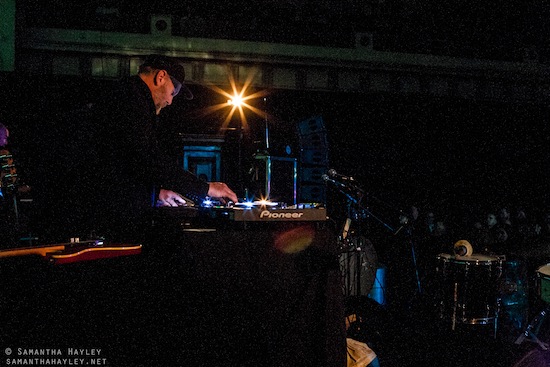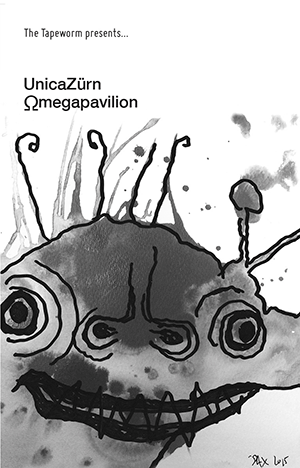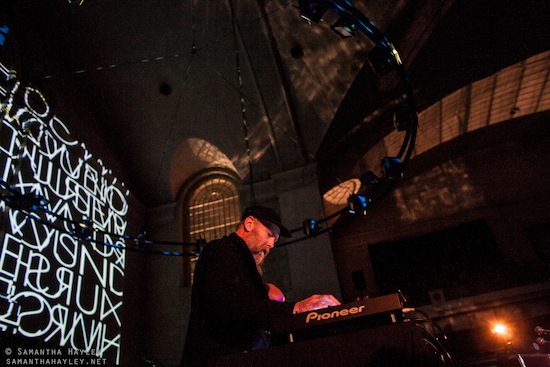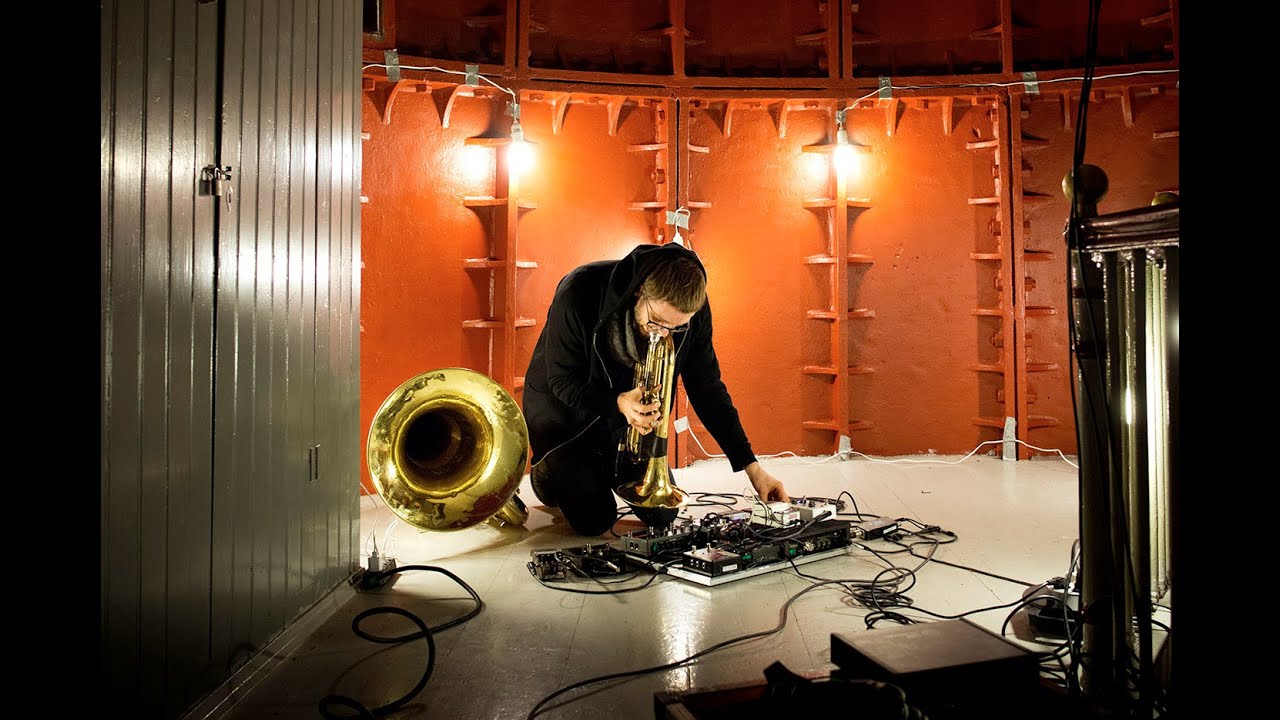There’s not much talking here at the Rum Music Library. With staff and visitors listening to the library’s acquisitions in custom-built, sound-proofed rooms, the actual sound – the room ambience – here is quite similar to that of the high street library. Footsteps, the gentle rustle of paper and the odd hushed enquiry unevenly punctuate the faint static hum of the building’s electrical supply.
The loudest noise was once the old pneumatic tube, our ceiling-mounted network of plastic pipelines that used to distribute memos and bulletins throughout the institution. The distinctive ‘pssthwupp’ that announced the arrival of a cylindrical capsule at a terminal was once commonplace, but its cadency is now so rare that my heart jumped when one recently dropped near my desk last week, the first in nearly a decade it is said.
Its content added to the mystery – inside there was a small piece of vellum bearing the ostensibly simple, but puzzling phrase:
"I’m in control, never gonna stop… Control, it’s what I got, because I took a chance".
Attracting the interest of colleagues who rarely speak to me, I asserted, in truth, that I did not know who sent it, but was also compelled to deny any knowledge as to its true meaning. Instead, I suggested it was a reminder of the importance of the balance between control and chance in experimental music, pointing out the statement’s double-oxymoron of being both "in control" yet "never gonna stop", and of gaining control through taking "a chance".
But the words were immediately familiar to me, even though I’d not comprehended them for thirty years. They were the chorus to Janet Jackson’s ‘Control’, a song I’d listened to an unhealthy amount of times under increasing levels of anxiety when it was released in 1986 due to the vinyl serially jumping, sending my dad on repeat trips to the local Our Price to exchange it for an unfaulty copy. Several stressful playbacks later the issue persisted leading to the conclusion that my record player was most probably at fault and not the pressing. The beats of producers Jimmy Jam and Terry Lewis were just too bombastic for my tinny Saisho Midi system, leading to a final exchange – this time to the non-skipping, but hissier, cassette format.
In the days that followed the strange message encouraged thoughts about the presentation of prepared sound and how potentially problematic this may be for artists. Do artists like Janet Jackson, Jimmy Jam or Terry Lewis realise the extent to which their art could be compromised by the formats it is distributed by? Can musicians and recordists adequately prescribe modes of playback, or is listening so subjective as to be uncontrollable?
Drøne – Reversing Into The Future
(Pomperipossa)
When Reversing Into The Future was presented at a Touch Conference in Seattle earlier this year, the vinyl edition, released by Anna Von Hausswolff’s Pomperipossa records, was played to an audience also there to witness live actions from Philip Jeck and Daniel Menche. Clearly the subtle, circular sound of a needle travelling in its spiral groove was an intended accompaniment to this extraordinary blend of field recordings, shortwave radio and modular synths, as opposed to the unblemished digital version.
In the brief sleeve notes drøne’s Mark Van Hoen and Mike Harding reveal that during their “analogue session… the forms seem to determine themselves,” prompting them to ask “how much control do we have? How much do we want?” By eschewing the more common inclination of musicians to determine what happens in sound, Harding and Van Hoen instead become both composer and listener, a combination that ensures the results are curated for their sensuous properties.
Reclaiming the word ‘drone’, an overused term that can suggest monotony and drudgery as much as music that uses long sounds, their curious cross through the ‘ø’ may nattily transpose its meaning to the Dutch verb for ‘hurtling’ along. And hurtle we do on broad beams of warm synth past pizzicato pulses, snaking sines, sparkling glass, telecom crackles and radio leakage towards the audio equivalent of a black hole. Constantly brimming with energy, yet filled with rich contrasts, the parade manages to be both musical and non-musical and seems different on each subsequent playback, maintaining its curiosity and charm.
Various artists – Songs Of The Blood Moon
(sofiarecords)
This fine compilation from Ireland’s Sofia Records has its contributors concede control of their compositions to the moon. It features thirteen lunatics from across the globe each of whom agreed to record a new track during the Supermoon lunar eclipse of September 27, 2015.
The concept gives the otherwise distinct offerings a neat temporal bond, as well as an attitudinal one in their collective willingness to spontaneously busk at night. This endows the compilation with a consistent sense of adventure with an esoteric edge, bringing to mind the oft reported strange effects of a full moon, all delivered by keen improvisational instincts.
Opening with a beautifully, yet lightly fried, shimmering on acoustic guitar, Yorkshire’s Neil Campbell (of Astral Social Club and Vibracathedral Orchestra) narrates a wry, self-deprecating tale of his attempts to get a good look at that night’s “bloody moon”. It sets an unusual tone, both refreshingly relaxed yet mysterious, that extends across the rest of the compilation. It is followed by a circulating raw drum solo from Woven Skull’s Willie Stewart, as much a textural treat as a rhythmic workout, while fellow ‘Skull, Natalia Beylis turns up on the other side with the longest and perhaps most affecting piece on the tape. Over almost quarter of an hour shifting cycles in her solo improvised piano seem to reveal ripples in time; imagined in a moonlit setting it’s as if its meandering possesses hidden meanings.
Other highlights include ‘Tetrad’ a hyperactive, acidic sci-fi barrage from Hacker Farm’s Nigel Long, United Bible Studies’ David Colohan plucking over the invisible foliage of radio transmissions on ‘NASA Says Not To Worry’ and the fruity fiddle solo of Tóla Custy’s ‘Whoa! Stop You Horse You’. But, unusually for a compilation, each track feels essential, together building a unique, arcane structure bonded by moon-minded mirth and magic.
Maja S.K. Ratkje – Crepuscular Hour
(Rune Grammofon)
The score for Crepuscular Hour is for three choirs, a church organ and three pairs of “noise musicians”. It allows the latter great freedom with instructions such as “calm and powerful, hectic background” and “improvise with sound colour” while being very strict about their cues. This genuinely awe-inspiring work from Norwegian avant-garde composer and vocalist extraordinaire Maja Ratkje is designed to surround its audience with dramatically contrasting sound to evoke ‘crepuscular rays’, those shafts of sunlight that strike the earth through gaps in the clouds like the hand of god.
The release includes a stereo mix of a performance in Huddersfield as well as a DVD of the same whose footage clearly shows the considered staging, its audience caught in the centre of a dimly lit church circled by the many singers and players. While the film clearly gets across the conditions in which Crepuscular Hour is performed, it is the audio recording, despite its reduced dimensions, that seriously knocks you out. Free from the distraction of watching the proceedings the rays of devotional song shine through clouds of electronic distillations in such a way as to seem natural accompaniments.
But this is no celebration, instead it travels from soft lament through portentous nervousness to a realm of terror. Forget Slayer, forget Orff’s Carmina Burana even – this is evil! The combination of ritualistic choruses of ancient texts and sinister and violent suggestions of machine gun fire, marching, thunder and occult danger initially provoke images of war and terrorism, ‘the evil that men do’ etc. But as the compelling piece drives onward you realise the crepuscular rays are not the hand of god, but the claw of the devil, as it invokes hell on earth in an immense and deliciously dark epic.
Nurse With Wound – Dark Fat (United Dirter)
A command of chaos is always guaranteed at a Nurse With Wound show. Despite being a legendary dealer of surreal suppositories for the ears since 1979, its live incarnation is only ten years old. Instead of the predominantly solo stewardship of Nurse With Wound’s releases by Steven Stapleton (assisted by one or other of his semi-regular co-conspirators), the gigging band is a veritable super-group, pooling the long-toothed talents of engineer of outsider electronics par excellence Colin Potter, master manipulator of foreign objects, Matt Waldron (AKA irr. app. (ext.)) and Andrew Liles’ rude and excessively excellent earwormery. Together they cast their expertly charged rods of melting modes over, under and into Stapleton’s bowed, ominous sediment.
Being a reliably awkward band, Dark Fat isn’t quite a live album in the regular sense, but is formed from recordings of their shows and rehearsals, all meticulously collaged together by Stapleton and Waldron into a generous two-hour dose of brimming excitement, equal parts danger and delight.
After a while it comes across like a phantasmagoric journey on a Victorian steam train where creaking carriages are populated by Ray Harryhausen’s skeletons whose bones clack in time with the voodoo-like rhythms of the wheels on the rickety track while the air is filled with the engine’s diverse, intoxicating vapours. The irregular stops at many and varied stations and maintenance depots see the carriage doors open up onto alien interzones where unpredictable excursions ensue, ranging from psychedelic wig out to electro-acoustic skullduggery.
While growing up in the eighties I tried to imagine what sort of futuristic bands I might see in the twenty-first century should I survive the supposedly imminent nuclear apocalypse. On the evidence of Dark Fat (a term they use to describe "Psychopathic scumbag individuals, regimes and corporate filth") I now realize Nurse With Wound are that band, nobly and gleefully playing against the absurdity of our times.

Sarah Davachi – Dominions
(JAZ Records)
Davachi’s compositions triangulate academic discipline, wayward technology and a fascination with the harmonic artefacts of sustained frequencies. The Canadian-born composer studied the likes of Bach and Chopin before graduating from California’s Mills College whose halls have boasted the talents of many of the pathfinders of American Minimalism and beyond such as Steve Reich, Laurie Andersen and Pauline Oliveros. Meanwhile, she worked as a tour guide in a museum of musical instruments, enabling her to explore the idiosyncrasies of many of yesteryear’s synthesizers.
Such a rich grounding was immediately evident across her debut LP, Barons Court, released last year by Students of Decay, its soft, pulsing combination of electronic suspensions and strings presented bucolic psychedelic and meditative raga-like modes that deftly strike a balance between restraint and instability.
Her follow-up release, Dominions, is even more refined, doing away with the strings on all but the last of five pieces to more deeply charter the obsolete electronics. In doing so each piece maintains a strong natural quality: instead of machines Davachi’s tenderly formed chords bring to mind those stop-motion films of plants growing – her sonic shoots turning into stems that strengthen, eventually budding to produce beautiful aural flora.
Tracks like ‘Burgundy’ also have a heady, hypnotic effect – as the reedy sounds acquire new layers their undulating vibrations become more pronounced and mesmeric to arrive at a folk dance of overtones. Although fertile and hallucinatory, Dominions is never brash or bold – Davachi holds each tone to the light with such care to reveal its subtlest of attributes; her fascination with sound is consistently presented in such an expert way as to be both healing and infectious.
Ahrkh Wagner – 2B
(Tesla Tapes)
Somehow I was surprised to find both tracks on this recent release from Manchester’s node of Gnod-related artistry, Tesla Tapes, use words and voice as their basis. Perhaps my expectations were skewed by enjoying Ahrkh’s time-defying electronic drones on last year’s Tone Mantra for ZamZamRec, its balm for the mind made with pure, organic electronics whose effect is not dissimilar to Davachi’s. This new cassette, in collaboration with Mark Wagner of Moon Ra, still retains an analogue frondescence, but one that has become curiously contaminated by speech and song.
The types of voices add a grounded whiff of free festivals to the stellar synth work: ‘Turn Off Your Mind’ reminds of ‘Sonic Attack’, the science fiction vignette from Michael Moorcock and Hawkwind, as Ahrkh Wagner cast a similarly commanding narrator. But instead of warning listeners of imminent destruction, their demands are more considerate, suggesting we adopt a suitably zoned-out mode of listening. Despite its determined delivery, the monologue gets increasingly corrupted, cut-up and scrambled, to mimic a frazzling of our frontal lobes perhaps. On the other side ‘Aw Sweet Sunshine’ loops a female voice singing a New Age campfire song ("We are opening up in sweet surrender to the luminous love light of the One") to form a mantra that gets progressively splashed by the washes of their machines.
By steering and ultimately subsuming vocal layers into their cosmic circuitry Ahrkh Wagner bring both drama and a rare romantic, libertarian lilt that bravely stands apart from the more common evocations of urban decay in electronic music.
Norman Westberg – The All Most Quiet
(Hallow Ground)
Next to Michael Gira, Norman Westberg is the longest serving member of Swans having migrated from its brutal eighties line-up to the current, epic incarnation. But as well as lending his grainy to gargantuan guitar arsenal to most permutations of the band over this time, he has more recently been experimenting with solo, minimal compositions.
Initially available in handmade, limited runs available from his own Etsy shop, they are now being re-released by the estimable Australian label Room40. 13 and MRIintroduced a different side to Westberg, serving up long form, ethereal environments whose often slow, graceful movements of timbre and texture lend a meditative vibe. And now the visionary Swiss label, Hallow Ground, release a new, equally satisfying, album suitably titled The All Most Quiet.
The title track’s initially soft, long-form modulations move in a meteorological fashion to form an otherworldly micro-climate in your listening space. In this way Westberg’s considered harmonic interactions suggest gradual increases in temperature and air pressure as his natural flow condenses and diffuses like clouds forming, occasionally darkening and becoming heavy but never breaking into anything approaching the severe storms of Swans’ repertoire.
Under the right listening conditions, ‘The All Most Quiet’ is a trance-like experience, the small catches at the end of some of his multi-layered loops even providing a light lattice of rhythm, evidence of the conductor behind the numinous weather forms.
Kristoffer Lo – The Black Meat
(Propeller Recordings)
On The Black Meat Kristoffer Lo literally collaborates with extreme weather. Installed in Ryvingen Lighthouse off the south cost of Norway, he improvises and responds on amplified trombone and tuba to the lashings his remote location is getting from a fierce storm. The epic title track has 22 minutes of tempestuousness, where the distinction between the building’s battering and Lo’s thunderous horns is blurred, like ink on severely water-damaged paper.
As well as being a display of God-like power, the piece also bears subtler impressionistic qualities that highlight the hidden rhythm in the storms passage along with more classically musical considerations like the glimpses of harmonic progression amidst the downpour.
The first side highlights the versatility of Lo’s minimal set-up. ‘Anodyne For Annihilation’ portends the storm with a monochromatically moody sky painted by his unhumanly long brassy breath, while ‘Front Row Gallows View’ has solemn yet ultimately jubilant orchestral streaks as if both celebrating and mourning the storm’s passing.
But by calling the album The Black Meat‘ Lo invokes a chapter of Burroughs’ Naked Lunch. It has a sailor circumvent a city attempting to procure the "flesh of the giant aquatic black centipede" whose affects are described as both "overpoweringly delicious and nauseating so that the eaters eat and vomit and eat again until they fall exhausted." With that in mind Lo’s stormy suite takes on a more depraved diorama that transforms the deluge into a gluttonous excess of maleficent vibrations.
Unicazürn – Omegapavilion
(The Tapeworm)

For their fourth album, Unicazürn, the duo of Stephen Thrower, one half of Cyclobe, and Shock-Headed Peter David Knight, AKA Arkkon, present three improvisations that take the listener from secret sewers to interstellar travel. Electing a cassette-only format that lends an additional analog patina to the webs of antiquated electronics they spin so well, Omegapavilion’s soundworlds bear a Kosmische vibe, but one that is darker and perhaps more possessing than its ‘Dream-y influences.
The first side is a single half-hour drift – elegantly flowing sonorous streams seem to be perpetually rising, not in tone but trajectory, to suggest a transcendence from underworld to space discovery. Here assumptions of a cold, lifeless vacuum start to erode as Thrower and Knight subtly synthesise the thrill of being among invisible presences with their emergent ululations, cries and diffusions.
Over on the other side ‘Heliomantra’s softly pulsing patches possess a reverent poise that gradually unfolds, thickening the atmosphere with its luxuriant layers. The set then closes with ‘Phosphor AKS’, the title’s notion of an unusual emittance of light aptly introduces the bright, magical synth theme that ensues.
Combining the intuition of improvisation with “intensive studio sculpting”, Unicazürn once more hit the spot for those with a thirst for adventure into the unknown, leaving its listeners transformed, nourished and patiently waiting for the next trip.



